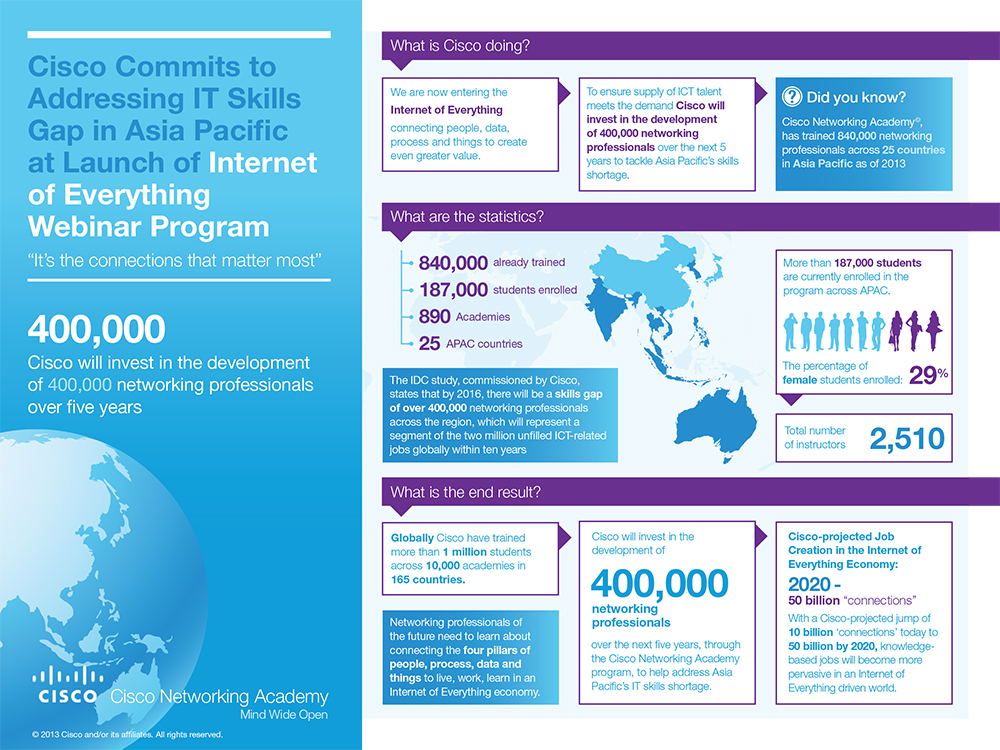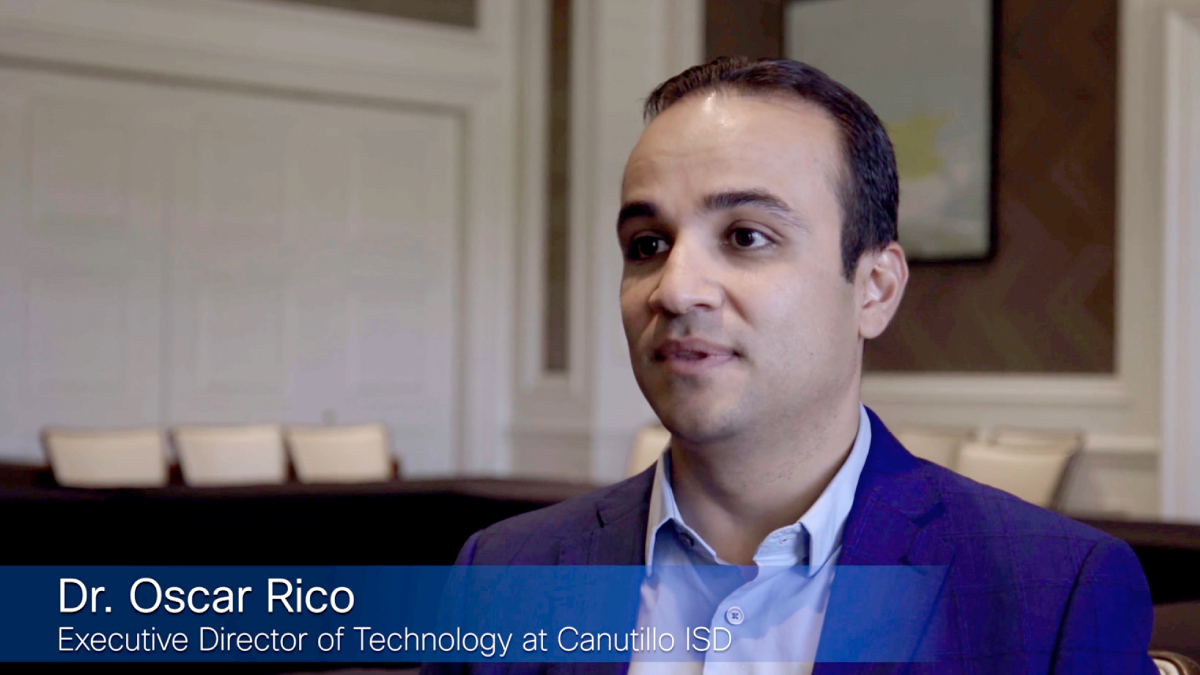SINGAPORE – December 05, 2013 – Cisco will invest in the development of 400,000 networking professionals over the next five years, to help address the IT skills shortage in Asia Pacific. Cisco made this commitment at the launch of the Internet of Everything webinar series designed to inspire the next generation of IT talent to pursue careers in the industry.
Highlights:
- The skills gap was outlined in the IDC study The Evolution of the Networking Skills Gap in Asia/Pacific.
- The IDC study, which was commissioned by Cisco, states that by 2016, there will be a skills gap of over 400,000 networking professionals across the region, which will represent a segment of the two million unfilled ICT-related jobs globally within ten years [1]. Without investment in skills, technology progress will not translate into productivity growth, and Asia Pacific will not be able to compete in an increasingly knowledge-based global economy.
- Over the next 10 months, the webinar series, which is available to all Networking Academy students, will cover various aspects of the Internet of Everything and the career opportunities it offers. The series will be a combination of both in-person and virtual utilizing Cisco's collaboration technologies such as Cisco TelePresence, Cisco WebEx and Cisco TV.
- Based on Cisco's projection of 10 billion "connections" today to 50 billion by 2020, knowledge-based jobs will become more pervasive in an Internet of Everything-driven world. As the Internet of Everything drives the transformation alongside next-generation and tech-savvy workers, job creation techniques will evolve.
- According to a recent study published by the World Bank, the information and communication technologies (ICT) sector is rapidly growing, with an addressable market of $800 billion globally.
- Recognizing this projection, Cisco is committed to meeting the critical demand for high-skill workers through strategic programs and collaborations for current and future generations.
- To support talent enablement in key areas and reduce this growing skills gap, Learning@Cisco, along with its partners, will deliver a new portfolio, consisting of IoT curricula, assessments and an upcoming Cisco Specialist Certification to advance skills development in industrial networking. This training and certification initiative, introduced at the Internet of Things World Forum, will help meet the growing need for specialized talent that can provide Internet Protocol (IP) networking expertise, with a focus in automation, manufacturing and energy and future expansion to include equally transformative industries.
Supporting Quotes:
- Bastiaan Toeset, Managing Director for Cisco's Customer Led business in Asia Pacific, Japan and Greater China
"Today, the Internet has a powerful impact on changing lives. Cisco powers the human network to create and support social innovation that improves the lives and opportunities of people across the region. We take a ‘shared value' approach to addressing social issues, and focus on applying our unique technology expertise to create strategic, relevant and sustainable programs and partnerships."
- Kevin Bloch, Chief Technology Officer, Cisco Australia
"We are now entering the Internet of Everything phase which Cisco describes as connecting people, data, process and things to create even greater value for economies and organisations. The network plays a critical role in the Internet of Everything - it must provide an intelligent, manageable, and secure infrastructure that can scale to support billions of people, intelligent devices and 'things' (such as sensors). Cisco's unmatched expertise in network technology transitions makes us uniquely positioned to help customers capture the value of the Internet of Everything. Through the Cisco Networking Academy and our world class certification program, we can help to train the workforce and address the skills gap in Asia Pacific and position graduates for the exciting world ahead in which nearly everything will be connected."
About the Webinar series
Cisco Networking Academy students can join the webinar series by enrolling on Cisco NetSpace, a cloud-based learning and collaboration platform that provides free online, up-to-date ICT curricula for students in 165 countries and professional development opportunities for instructors in the Networking Academy program.
Links:
Internet of Everything Webinar: http://www.cisco.com/web/AP/IoEWebinarSeries
Follow the hashtag: #ioe
Cisco Networking Academy on:
- Twitter: @CiscoNetAcad
- Facebook: https://www.facebook.com/cisconetworkingacademy
- YouTube: http://www.youtube.com/playlist?list=PLA48B49E7FB15439B
- Google+: https://plus.google.com/106061480590458723565/posts
- LinkedIn: http://www.linkedin.com/groups/Cisco-Networking-Academy-55702?home
IDC Study: The Evolution of the Networking Skills Gap in Asia/Pacific
Cisco on Twitter: @CiscoAPAC
To learn more about Cisco training and certifications, visit the Cisco Learning Network: www.ciscolearningnetwork.com
About the Cisco Networking Academy
The Cisco Networking Academy is Cisco's largest social investment initiative that uses a public-private partnership model to create the "world's largest classroom" working with educational institutions, nonprofits, governments and other international and local agencies. Every year, the Networking Academy teaches hundreds of thousands of students worldwide with the skills needed to design, build, manage, and secure computer networks, helping to enhance these students' career prospects and fill the global demand for networking professionals. With 900 Academies across 24 countries in Asia Pacific, the Networking Academy delivers classroom instructions, online teaching materials, and interactive tools and hands on learning to students from every socioeconomic background, so that they can develop the knowledge and skills required to succeed in a technology-driven market. Cisco has established over 10,000 academies in 165 countries, helping individuals build ICT skills and prepare for industry-recognized certifications and entry-level ICT careers in most industries. Students develop foundational skills in ICT while acquiring career skills in problem-solving, collaboration and critical thinking.
About Learning@Cisco
Learning@Cisco addresses the need for Cisco technical talent worldwide by providing the educational resources, training, certifications, communities and consulting services that accelerate productivity, opportunity, and growth.
About Cisco
Cisco (NASDAQ: CSCO) is the worldwide leader in IT that helps companies seize the opportunities of tomorrow by proving that amazing things can happen when you connect the previously unconnected. For ongoing news, please go to http://thenetwork.cisco.com. Cisco products are supplied in Singapore by the channel partners of Cisco Systems International B.V., a wholly owned subsidiary of Cisco Systems, Inc.
[1] "ICT For Greater Development Impact," World Bank (June 2012); European Commission Global Economic Outlook. http://www.worldbank.org
# # #
Cisco and the Cisco logo are trademarks or registered trademarks of Cisco and/or its affiliates in the U.S. and other countries. A listing of Cisco's trademarks can be found at www.cisco.com/go/trademarks. Third-party trademarks mentioned are the property of their respective owners. The use of the word partner does not imply a partnership relationship between Cisco and any other company.
Addendum ‑ Background on IDC Report
- IDC conducted 504 interviews in eight countries in Asia Pacific: Australia, India, Indonesia, Korea, Malaysia, Philippines, Thailand and Vietnam.
- Interviews were segmented by vertical industry and size segments: government, health care, telecoms, financial, manufacturing, retail/wholesale, media/broadcasting/publishing, travel/transport/distribution, natural resources and other services in companies with more than 75 employees.
- The study was fielded in two of the largest global economies in APAC: Australia and India. Across APJC the study was conducted in four of the largest global economies: Australia, China, India and Japan.
- Those interviewed included only companies that have ICT service staff in-house, excluding IT staff used via outsourced delivery models.
IDC Skills Gap Findings
- Almost half of the global unemployment is in Asia Pacific.
- There is a networking skills gap for eight specified countries within Asia Pacific (Australia, India, Indonesia, Korea, Malaysia, Philippines, Thailand and Vietnam).
- Networking skills are in demand. The future demand for networking professionals requires an increase in essential and emerging skills development.
- Essential: Routing, Switching, Wireless, VOIP and Security Skills (Security Skills were once a specialist skill; now they are classified an essential skill).
- Emerging: UC, Video, Cloud, Mobile, Data Centre Virtualisation.
- In 2012, there was a shortage of over 250,000 skilled networking professionals across APAC. By 2016, the skills gap will increase to over 480,000.
- Security skills are the most difficult to fill, with 82% of companies interviewed agreeing that they will need extra security skills in the next 12 to 24 months.
- Thirty-nine percent of respondents see more value in certification if they are recognized by the government. Thirty-six percent of respondents see more value in certification if itis sponsored by Technology vendors.
- Seventy-four percent of respondents are expected to need multiple technology skills. This is the result of a need to offset the lack of skilled workers as well as to build a flexible pool of multi-skilled workforce.







